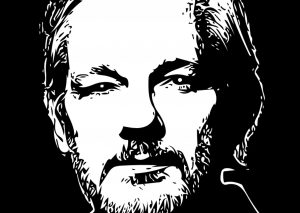20 Feb 2024 | News and features, Statements, United States

Julian Assange; illustration: Hafteh7
Today, as a panel of High Court judges convene the last stage of UK proceedings in the US government’s extradition case against Assange, we reiterate our urgent calls to free Julian Assange. This week’s hearing marks the beginning of the end of his extradition case, as there can be no further appeal in the UK.
Not only will extradition put Assange at risk, given his mental health, but it will inevitably have a serious chilling effect on media freedom around the world. We fear that he will not face a fair trial in the United States given the hostile publicity around the case.
Wikileaks published a series of leaked diplomatic cables in 2010 and 2011, which caused serious embarrassment to the United States government. These included the US army manual on the treatment of prisoners in Guantanamo Bay and a video showing a helicopter attack on innocent civilians in Iraq. Assange acted as a journalist and publisher in bringing these disclosures to public attention. He did so in collaboration with a number of mainstream, respected media organisations including the Guardian and the New York Times.
We call on the international community to support Assange in this, the final stage of his battle against extradition. If the US government succeeds in bringing espionage charges against Assange it will have the potential effect of turning all journalists reporting on alleged US security abuses into spies.
17 Jun 2022 | News and features, Statements, United States

Julian Assange; illustration: Hafteh7
Index on Censorship is seriously concerned about the latest developments in the Julian Assange case. It is deeply disappointing that Home Secretary Priti Patel has approved the extradition of the Wikileaks founder to the United States, where he will face charges under the Espionage Act.
Like Amnesty International, we believe extradition will put Assange at risk and have a chilling effect on journalism around the world. We do not believe he will face a fair trial in the United States given the hostile publicity around the case. His poor mental health puts him in danger of suicide.
Wikileaks published a series of leaked diplomatic cables in 2010 and 2011, which caused serious embarrassment to the United States government. These included the US army manual on the treatment of prisoners in Guantanamo Bay and a video showing a helicopter attack on innocent civilians in Iraq. Julian Assange acted as a journalist and publisher in bringing these disclosures to public attention. He did so in collaboration with a number of mainstream, respected media organisations including the Guardian and the New York Times.
We call on the international journalistic community to support Assange in the next stage of his battle against extradition as he takes his case to appeal. If the US government succeeds in bringing espionage charges against Julian Assange it will have the potential effect of turning all journalists reporting on alleged US security abuses into spies.
14 Jun 2021 | Croatia, Monaco, News and features, Uncategorized
[vc_row][vc_column][vc_column_text] An oil industry whistleblower who has been held in Croatia for almost a year on extradition charges has revealed further explosive claims about his former employer.
An oil industry whistleblower who has been held in Croatia for almost a year on extradition charges has revealed further explosive claims about his former employer.
Jonathan Taylor, who in 2013 revealed a bribery and corruption scandal at the Monaco-based Dutch oil company SBM Offshore, claims the company was also involved in a deal which saw tens of millions of dollars promised to a Panamanian company run by a powerful and allegedly corrupt Angolan official.
Taylor released documents to whistleblowing networks and the media which show that British oil company BP had paid $100 million to cancel a shipyard construction project in Angola. A third of the money owed from the cancellation of the deal to build floating oil platforms was earmarked for Sonangol International Inc, run by Baptiste Sumbe. There was no suggestion this agreement was reached with BP’s knowledge or consent.
Taylor’s revelations come as he approaches the anniversary of his arrest on an Interpol red notice while on holiday in Croatia with his wife and three teenage children. Taylor says he is being targeted as retaliation for his whistleblowing.
In 2013, Taylor gave evidence of bribery by SBM Offshore, for whom he worked as a lawyer, to the UK Serious Fraud Office, as well as investigators in the Netherlands and Brazil as well as the FBI.
Taylor’s allegations were at the centre of what became known as the “Petrobras scandal”, where SBM was accused of paying bribes to Brazilian government officials.
As a result of Taylor’s whistleblowing, SBM Offshore was fined over $827 million after being found to have used bribery payments in excess of $275 million.
Taylor now faces extradition to Monaco. On 18 May this year, despite a 10-month long appeal since his detention, the Supreme Court of Croatia issued a judgement confirming the extradition. In response, 40 legal experts, NGOs and campaigners signed an open letter calling for the extradition to be halted. The decision currently rests with Croatian justice minister Ivan Malenica, to whom the letter was addressed.
Taylor is also being targeted with a defamation suit in the Dutch courts, which many consider to be a strategic lawsuit against public participation or SLAPP. The company sought a public apology and damages of €630,000. The claim was not upheld in the Dutch courts, but Taylor faced lengthy and costly court dealings.
He was released on bail on 4 August 2020 and, although Interpol’s red notice has now been withdrawn, Taylor has been forced to remain in Croatia and is facing extradition to Monaco so he can be “interrogated” over alleged offences.
Taylor has been targeted by SBM ever since he blew the whistle on them.
In 2014, his former employers made a complaint to the authorities in Monaco that Taylor had attempted to extort them but could provide no evidence of this and have since withdrawn the complaint.
Taylor’s situation means there has been concern over his mental health. When British diplomats raised these concerns in response to the lawyer’s own fears, he was held in a psychiatric hospital overnight against his will in May earlier this year.
He described the experience, stating that a substance was “forcibly injected” into him.
“Shortly after this I was taken to a room, still cuffed, where I was strapped to a bed by my feet and legs and my hands,” he said. “I then refused unidentified tablets and was invited to swallow them whilst someone held a cup of water to my mouth. I refused. I was then forcibly turned and something was injected into my upper thigh.”
As the anniversary of Taylor’s arrest approaches, whistleblowing charity Protect has called on the UK government to take further action. It has currently only sought only sought assurances that Taylor will be treated fairly if extradited, but has not called on Monaco to withdraw the extradition request.
Andrew Pepper-Parsons, head of policy at Protect, said “These latest disclosures from Jonathan Taylor show just how vital whistleblowers are to revealing corruption. Despite this, Taylor has been held in Croatia for months facing extradition on baseless claims. It is a clear abuse of process which threatens to set back whistleblowing years and sends a terrifying message to whistleblowers across the continent. The UK government needs to take a more robust stance. It must secure Taylor’s safe return home and call on the Monegasque authorities to drop the extradition”.[/vc_column_text][/vc_column][/vc_row][vc_row][vc_column][three_column_post title=”You may also like to read” category_id=”256″][/vc_column][/vc_row]
14 Jun 2012 | Europe and Central Asia, Index Index, minipost
Wikileaks founder Julian Assange has been denied a request to re-open his appeal against extradition to Sweden. In a statement issued today, the United Kingdom’s Supreme Court said that the decision to reject the request made by Dinah Rose, Assange’s lawyer, was “unanimous”. On 30 May, the court decided to allow Assange’s extradition by a 5-2 majority. Swedish authorities want to question Assange about two sex crime allegations brought against him. The activist fears that the possible charges are “politically motivated”, and has attorneys have announced plans to take the case to the European Court of Human Rights.


 An oil industry whistleblower who has been held in Croatia for almost a year on extradition charges has revealed further explosive claims about his former employer.
An oil industry whistleblower who has been held in Croatia for almost a year on extradition charges has revealed further explosive claims about his former employer.